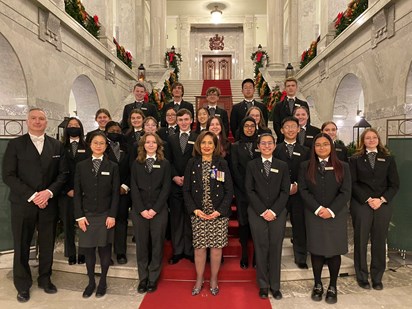
As His Majesty The King's representative in Alberta, the Lieutenant Governor fulfills a very important constitutional role in safeguarding elements of Canada's democratic system of government. These duties are steeped in history and tradition.
Royal Assent
One of the Lieutenant Governor’s key constitutional functions is to grant Royal Assent to bills passed by the Legislative Assembly, giving them the force of law. The Lieutenant Governor also signs Orders-in-Council and other Cabinet documents to give them the force of law.
Ensuring the Province has a Premier
It is the Lieutenant Governor's duty to ensure the province has a Premier. The position of the Premier can become vacant for a variety of reasons, such as an election, resignation, defeat in the Legislature or death.
Swearing-in Cabinet and MLAs
The Lieutenant Governor invites a new Premier to form a government and must then swear-in the new members of the Cabinet. The Lieutenant Governor also swears-in all Members of the Legislative Assembly following general elections and by-elections.
It is important to note that Lieutenant Governors are expected to remain apolitical, meaning that they do not express support for one political party over the other in the course of their duties.
Legislature Sessions
The Lieutenant Governor summons and ends (prorogues) the Legislature, reads the Speech from the Throne at the opening of each session, and dissolves the Legislature prior to an election.
At major constitutional events such as the opening of the Legislature, the Lieutenant Governor is traditionally accompanied by the Vice-Regal Escort
If the Lieutenant Governor is unavailable, the Chief Justice of Alberta may fulfill constitutional duties in their role as Administrator.